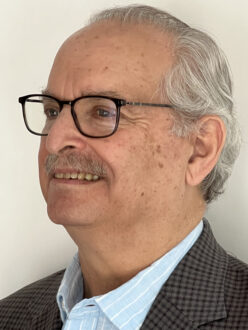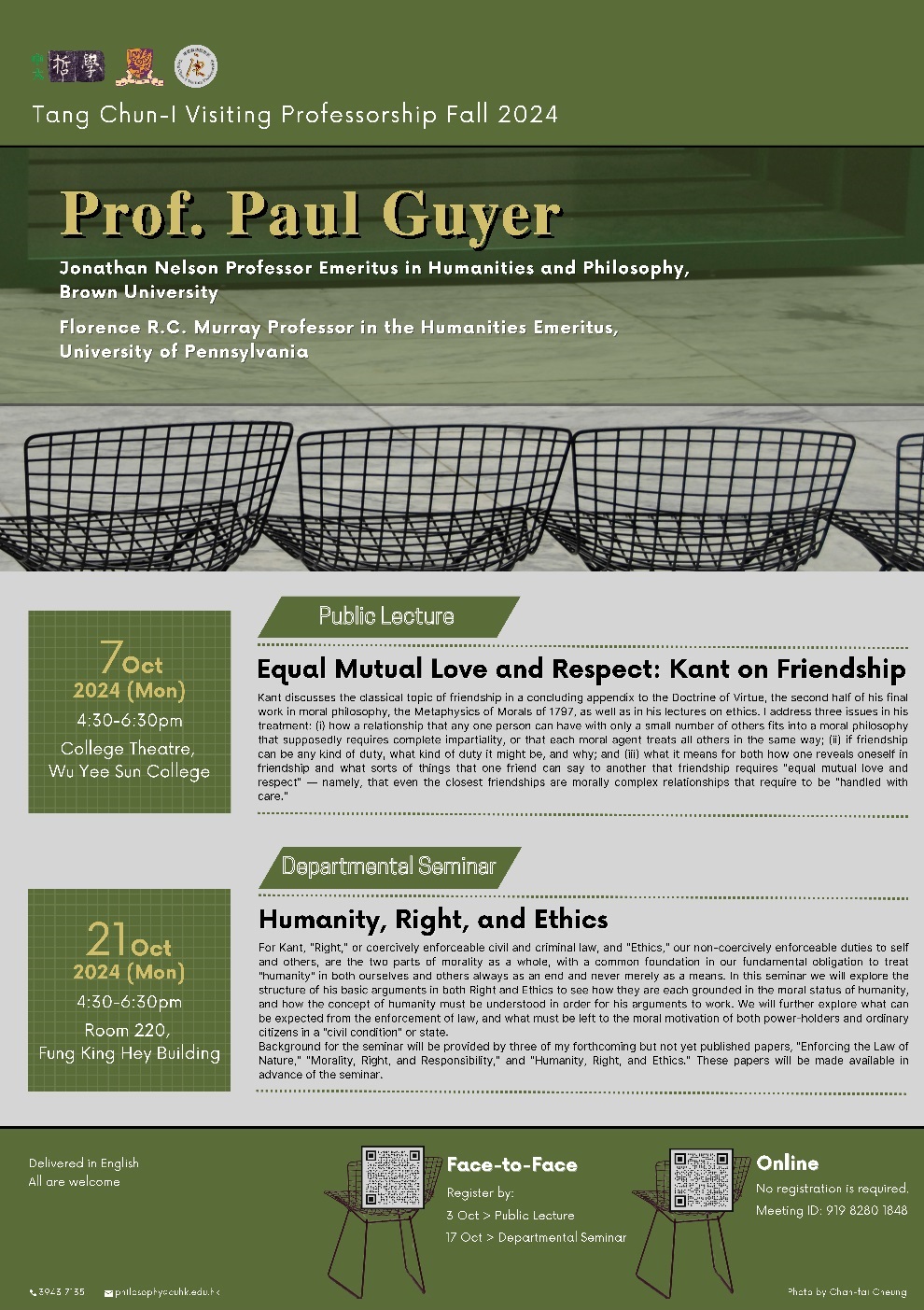
Paul Guyer
Prof. Paul Guyer
Jonathan Nelson Professor emeritus in Humanities and Philosophy at Brown University
Florence R.C. Murray Professor in the Humanities emeritus at the University of Pennsylvania
Paul Guyer received his PhD at Harvard University in 1974. His teachers included Stanley Cavell and John Rawls. He is the Jonathan Nelson Professor emeritus in Humanities and Philosophy at Brown University and the Florence R.C. Murray Professor in the Humanities emeritus at the University of Pennsylvania; he also taught at the University of Pittsburgh, the University of Michigan, the University of Illinois-Chicago, Princeton University, and Harvard University. His dissertation was on Kant’s aesthetics, leading to his first book, Kant and the Claims of Taste (1979); he has worked more broadly on both Kant and aesthetics throughout his career. He is the author, editor, and/or translator of more than thirty books, including Kant and the Claims of Knowledge (1987), Kant on Freedom, Law, and Happiness (2000), Kant (2006/2014), A History of Modern Aesthetics (3 vols., 2014), Virtues of Freedom (2016), Reason and Experience in Mendelssohn and Kant (2020), A Philosopher Looks at Architecture (2021), Idealism in Modern Philosophy (2023, with Rolf-Peter Horstmann), and, most recently, Kant’s Impact on Moral Philosophy (2024). He was General Co-Editor of The Cambridge Edition of the Works of Immanuel Kant in English Translation, and in that series co-edited and co-translated the Critique of Pure Reason, and edited and co-translated the Critique of the Power of Judgment and Kant’s Notes and Fragments. He also edited three different Cambridge Companions on Kant. He has published more than three hundred journal articles and book chapters.
Guyer has been president of both the American Philosophical Association Eastern Division and the American Society for Aesthetics, and was chairman of the board of the North American Kant Society for many years. He is a Fellow of the American Academy of Arts and Sciences and a Corresponding Member of the Academy of Athens. He has held fellowships from the National Endowment for the Humanities, the John Simon Guggenheim Memorial Foundation, the Princeton University Center for Human Values, and the American Academy in Berlin, and has been an Alexander von Humboldt Foundation Research Prize Winner. His other honors include the Matchette Prize of the American Philosophical Association, the Centennial Medal of the Harvard Graduate School of Arts and Sciences, and the International Kant Prize (2024).
Professor Guyer continues his research with a focus on Kant’s moral and political philosophy in historical context.
Equal Mutual Love and Respect: Kant on Friendship

Joining the Face-to-Face Talks (Please register by 3 October 2024): https://cloud.itsc.cuhk.edu.hk/webform/view.php?id=13694835
Joining the Talks Online (No registration is needed):
Zoom Meeting ID: 919 8280 1848
Link: https://cuhk.zoom.us/j/91982801848
Recording (Passcode: o0gkw$Vu)
For inquiries, please email to philosophy@cuhk.edu.hk
Abstract:
Kant discusses the classical topic of friendship in a concluding appendix to the Doctrine of Virtue, the second half of his final work in moral philosophy, the Metaphysics of Morals of 1797, as well as in his lectures on ethics. I address three issues in his treatment: (i) how a relationship that any one person can have with only a small number of others fits into a moral philosophy that supposedly requires complete impartiality, or that each moral agent treats all others in the same way; (ii) if friendship can be any kind of duty, what kind of duty it might be, and why; and (iii) what it means for both how one reveals oneself in friendship and what sorts of things that one friend can say to another that friendship requires “equal mutual love and respect” — namely, that even the closest friendships are morally complex relationships that require to be “handled with care.”
Conducted in English
All are welcome
Humanity, Right, and Ethics

Joining the Face-to-Face Talks (Please register by 17 October 2024): https://cloud.itsc.cuhk.edu.hk/webform/view.php?id=13694835
Joining the Talks Online (No registration is needed):
Zoom Meeting ID: 919 8280 1848
Link: https://cuhk.zoom.us/j/91982801848
Recording (Passcode: &813kTrf)
For inquiries, please email to philosophy@cuhk.edu.hk
Abstract:
For Kant, “Right,” or coercively enforceable civil and criminal law, and “Ethics,” our non-coercively enforceable duties to self and others, are the two parts of morality as a whole, with a common foundation in our fundamental obligation to treat “humanity” in both ourselves and others always as an end and never merely as a means. In this seminar we will explore the structure of his basic arguments in both Right and Ethics to see how they are each grounded in the moral status of humanity, and how the concept of humanity must be understood in order for his arguments to work. We will further explore what can be expected from the enforcement of law, and what must be left to the moral motivation of both power-holders and ordinary citizens in a “civil condition” or state.
Background for the seminar will be provided by three of my forthcoming but not yet published papers, “Enforcing the Law of Nature,” “Morality, Right, and Responsibility,” and “Humanity, Right, and Ethics.” These papers will be made available in advance of the seminar.
Conducted in English
All are welcome




